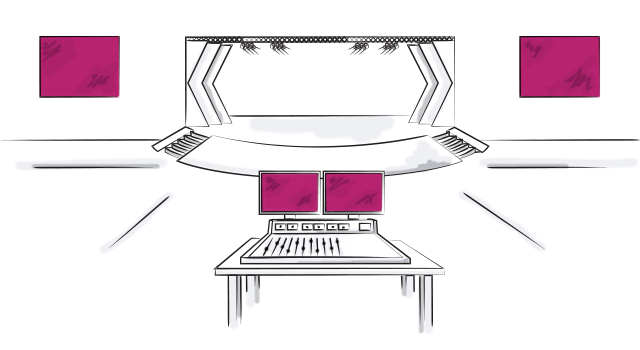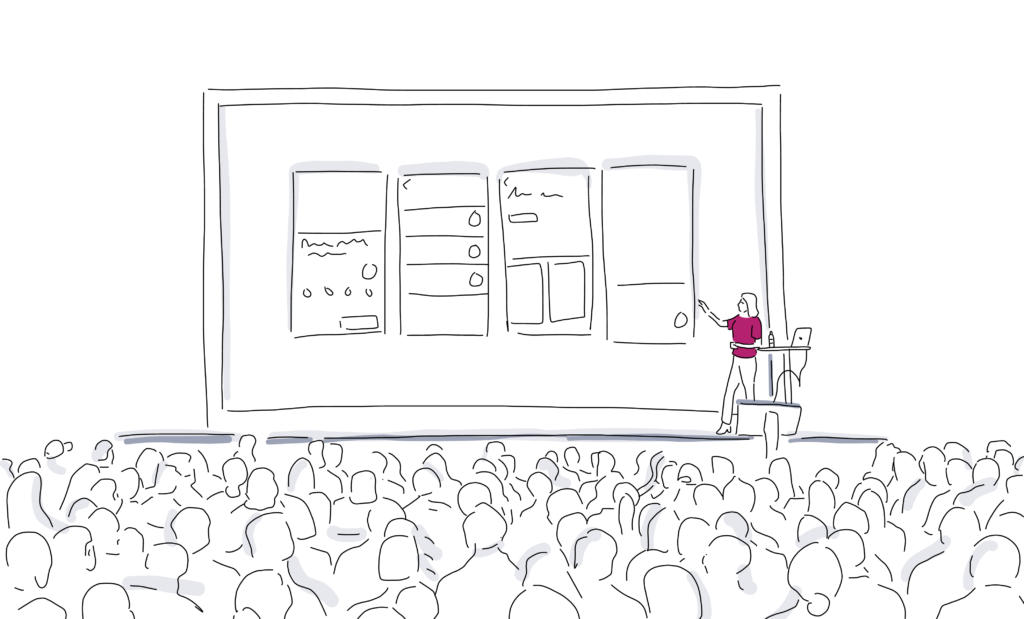
5 Things to Know Before Signing a Hotel AV Contract (& 10 Questions to Ask!)
The events industry can be complex and confusing at times– and a hotel AV contract is no different. There is always the question of using the in-house AV provider or bringing in your own. Let’s look at five specific things you should know before signing a hotel AV contract.
[Tweet “With AV at events: there’s always the question of using in-house AV or bringing your own. “]
Explore AV Contract Essentials

1. You Always Have a Choice of Audio Visual Providers
You have a choice between using the hotel’s AV provider or bringing in your own. Don’t be pressured or misled by catering contracts and overly aggressive AV salespeople. You are the customer and you have power. Hotels’ main focus are in room rentals and catering sales. AV is an added revenue stream for them. Hotel contracts may attempt to deter you from bringing in your own AV but you have options.
Before you sign a hotel AV contract, negotiate out any terms that require you to use their AV services or pay fees for not doing so. Leverage your event business value to the hotel against binding AV terms and win your freedom to choose. This keeps your options open and pushes the hotel AV provider to be more competitive. After all, it’s your event and you should be able to choose who you work with.
2. Know Where Costs Come From For A/V Equipment
To understand costs, you need to know how and why they are there, to begin with.
The audio visual company pays commissions to the hotel to be in-house and have access to hotel guests. In some cases, they pay large signing bonuses to get a contract with a hotel or a portfolio of hotels. The AV company purchases the gear and pays the salaries of any AV staff at the hotel and temporary AV contractors. The hotel isn’t responsible for any of these expenses. The hotel provides an office and storage space for gear to the AV provider. Equipment rental rates are set to recoup signing bonuses, cover AV provider operating expenses (including commissions paid to the hotel or venue), and profit above all. Same applies to convention centers with in-house AV.

Whether you pay one bill to the hotel or you pay the hotel and the in-house AV company on separate invoices, the breakdown between them is the same. The problem is the customer is the one who pays in the end. It seems easy and convenient to just use the hotel’s AV service. But at what unnecessary cost to your event budget? Outside AV providers can do just as good if not better of a job with your event as the in-house and potentially cost less. Do the math and figure out what works best for your event and budget.

3. Added Fees and Service Charges for Audio/Visual for Events
Let’s not forget the service charges. Service charges of 20% and higher get added to your AV bill at some venues. What is that really for anyway? When I was an AV Director in hotels for a large AV company it was explained to me that service charges are to cover F&B labor. But, if that’s the case, why is there AV labor and a service charge on the same bill? My advice: look for this and question it.
Regardless of how it’s justified, outside AV providers typically don’t charge service charges. I used to omit service charges if the set up required extensive labor and operators. I would only apply them if it was a simple set up and tear down during normal business hours and there was no other labor being charged. This seemed like a win-win for both the AV team and the client.
[Tweet “Ask about added fees and services charges so you can negotiate the best hotel AV contract.”]
Generally speaking, the hotel’s AV rental and labor rates could run higher than outside AV providers’ rates, for reasons mentioned above. There are a lot of AV providers out there. Choose the one that is right for you and your event. It could be the hotel’s in-house AV or your own provider. Just be sure to get the best rate before signing your hotel AV contract.

4. The Cheapest Option Isn’t Always the Best A/V for Your Event
Cheap doesn’t always mean the best price. When planning events, it’s always wise to get a few outside AV bids and an in-house AV bid for your event. This ensures you are getting the best price and services. Key word here being services! Provide as much information about the event and number of people attending as you can along with room size and ceiling height if you have selected the venue.
Do an apples to apples comparison. Do a deep dive on where the major differences lie. One AV company’s vision for your event or RFP interpretation may be very different from another’s. Gear can be packaged or itemized with gadgets and gizmos that mean nothing to you. Itemized or packaged rates can be good as long as your needs are covered. Overpriced rack rate line items and huge discounts can just put prices where they should have been, to begin with. Choosing the lowers price could get you the price you want but not the production value and scale of service you need.
Chat directly with your AV contacts about your event’s objective and event flow. Choose with the AV provider you feel the most comfortable with and who has the better understanding of your event. Cheap isn’t always the best. Remember, you always have a choice!

5. Know Your Event Budget Killers
Power, rigging, and internet costs can kill your event budget if not considered during facility and AV contracting. Be sure to get the facts and figures before you book your venue and contact your AV provider.
For example, event electrical power, group internet usage, and rigging needs can vary depending on the scope of your event. Even if you don’t use the internet and your event is ground supported, you’ll need power. But, I’ve seen in-house AV companies charge for wall power if you plug into standard wall outlets. It is normal to pay for the high amp 3 phase power disconnects and usage but not wall power.
Outside AV providers have no control over these charges to the master account. The in-house AV provider or facility controls all rigging policy, electrical service, and internet access points. In-house AV providers can leverage these services against you using an outside AV provider. Have a plan for the scale and scope of production you want for your event before you begin venue selection. Negotiate these items into your contract while keeping your options open to use an outside AV provider. The facility will often require the use of their rigging labor and equipment for safety reasons and that’s not necessarily a bad thing.
You have a lot of choices when it comes to AV. You could sign a hotel AV contract or bring in an outside provider. Keep your options open until you have all the facts, and feel comfortable you’ve made the best choice available to you. Paying close attention to these five areas could help you make a more informed choice. Next, learn ten questions to ask to narrow down your audio-visual provider.
10 Questions to Ask Equipment & Audio/Visual Rental Vendors Before an Event
Since a large percentage of equipment used for events is rented, it’s important to ask your equipment rental vendor the right questions to ensure your rental goes smoothly and the equipment performs according to expectations. The questions should vary based on a number of variables, including the location and venue, the type of event, and the equipment being rented. Start by asking these 10 questions long before you’ve agreed to work with an equipment rental vendors.
- Can you share a few client references? If you’re trying an equipment rental vendor that you’ve never worked with before (which is often unavoidable), nothing provides transparency, validation, and insight better than speaking with two or more of the vendor’s clients and hearing their opinions.
- Have you provided equipment for events at this venue before? While previous experience isn’t an absolute necessity, an equipment rental vendor that is familiar with your venue may be able to make suggestions about the right size, amount, and type of equipment you need”and also to anticipate potential issues.
- Does the rental include an operator? Obviously, this question only applies to certain types of equipment that require an experienced operator. But, if an operator is required, be sure to find out if the vendor can provide one, and how much it will add to the cost of the rental.
- Do you offer set-up and tear-down service? Similar to question 3, some equipment can be difficult, time-consuming, or require technical expertise, just to set up and take down properly. Make sure your vendor provides the support you need and includes the cost in the rental estimate.
- Is a lift-gate required to get the equipment on and off my truck? If you or one of your people is loading and/or unloading the equipment, be sure to ask if a lift gate is necessary. I know this sounds like a basic, no-brainer question, but it gets overlooked often and results in unhappy planners, unhappy customers¦ and sometimes¦ sore backs.
- Are you familiar with how union contracts work at this venue? This goes back to question 2. A vendor that’s familiar with your venue probably knows if union labor is mandated and the rules and exceptions related to equipment set-up, tear-down and operation.
- What is your early cancellation policy? Event Planners know that the unexpected should be expected. Equipment rental can be an expensive line item, so having a clear understanding of the cancellation policies is just smart.
- Does your rental contract require me to add you to my liability insurance? Some equipment rental contracts require that renters add the rental vendor to their liability policies to protect the vendor in the event of accidents involving the equipment. It’s a good idea to proactively ask so there are no misunderstandings (and unnecessary legal headaches) later.
- Can I get a copy of the replacement costs/equipment value? For insurance purposes, and to be aware of your potential exposure, it’s wise to know the total value/replacement costs of the equipment you’re renting.
- Who’s responsible for equipment damages occurring during transit? The ideal equipment rental contract specifies that you (the renter) have no liability until the equipment arrives at the event location. Other contracts hold you (the renter) responsible for damages that occur during shipping. Make sure you’re clear whose responsible during each phase of the equipment transport process and leverage the rental insurance options appropriately, based on the value of the equipment and your liability.
Asking questions and gaining clarity is important to ensure a successful equipment rental experience. But, the best advice is to do your up front research to find an equipment rental vendor you can trust and will answer all of your important questions before you even have to ask.
Up next, see the essential AV checklist for events, and get great event lighting design ideas.
What factors into your decision as to whether you sign a hotel AV contract or not? Let us know what you think on Twitter!

